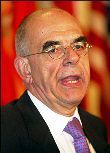‘Not yet time’ for sanctions against Sudan: UN envoy
 OSLO, Sept 6 (AFP) — The time has not yet come to impose international sanctions against Sudan’s government, UN Secretary General Kofi Annan’s envoy Jan Pronk said on Monday, calling instead for a large observer mission to its strife-torn, crisis-ridden Darfur region.
OSLO, Sept 6 (AFP) — The time has not yet come to impose international sanctions against Sudan’s government, UN Secretary General Kofi Annan’s envoy Jan Pronk said on Monday, calling instead for a large observer mission to its strife-torn, crisis-ridden Darfur region.
“You should always keep sanctions in mind as a last instrument but it is not yet time to use the last instrument,” Pronk told reporters during a visit to Oslo, following talks with Norwegian Foreign Minister Jan Petersen.
“Sanctions, don’t forget, is a very cheap instrument,” he said.
His comments came almost a week after the expiration of a UN ultimatum to Sudan, in which it gave Khartoum a 30-day deadline to disarm its proxy Arab militia, the Janjaweed, who are accused of atrocities against Darfur’s people of black African origin.
The government was also to withdraw its regular forces from around the camps for displaced people in the western Darfur region and ensure free access to the area for aid agencies.
Pronk said he had detected some progress being made by the government, such as a marked improvement in security and the suspension of “the disastrous policy of forced returns”.
But he said that “the key chapter” — the disarmament of militias — was still not accomplished.
“I do not have evidence of close cooperation between the military and the Janjaweed,” he said.
“What I want to see is the military fighting the Janjaweed but they’re not doing it. They’re not stopping it. If they can’t do it, they (the Sudanese government) have to ask for international support,” Pronk said.
Pronk reiterated that he would rather see the international community send observers to Darfur than impose sanctions.
“The major instrument that the international community has to protect the people is to send observers, whether they are African observers or other observers, but (there should be) enough (of them), with a good mandate and a lot of logistical support,” he said.
“Even if you don’t call them a protection force but you call them a monitoring force, if you would have thousands of these people, it would deter attacks coming from the Janjaweed,” he said.
The Janjaweed, the pro-government Arab militia, is accused of massacring Darfur’s black African population and systematically raping the women.
Since February 2003, when rebels launched an uprising to demand an end to what they see as discrimination against non-Arab ethnic minorities in Darfur, some 30,000 to 50,000 people have been killed and hundreds of thousands displaced.
There are currently some 120 African Union (AU) observers in the region, which is the size of France. They are protected by an AU force consisting of some 300 troops.
Peace talks in the Nigerian capital, Abuja, between Darfur’s rebel groups and the Sudanese government were stalled on Monday in their third week over the issue of disarmament, officials from the African Union said.
Pronk said that if those talks failed, there was a risk that the government would actively cooperate with the militia against the civilian population.
He added however that “at the moment, the Janjaweed is strong enough to carry out their policy of ethnic cleansing on their own. So that is what they are doing. They don’t need government helicopters to wipe out villages”.
